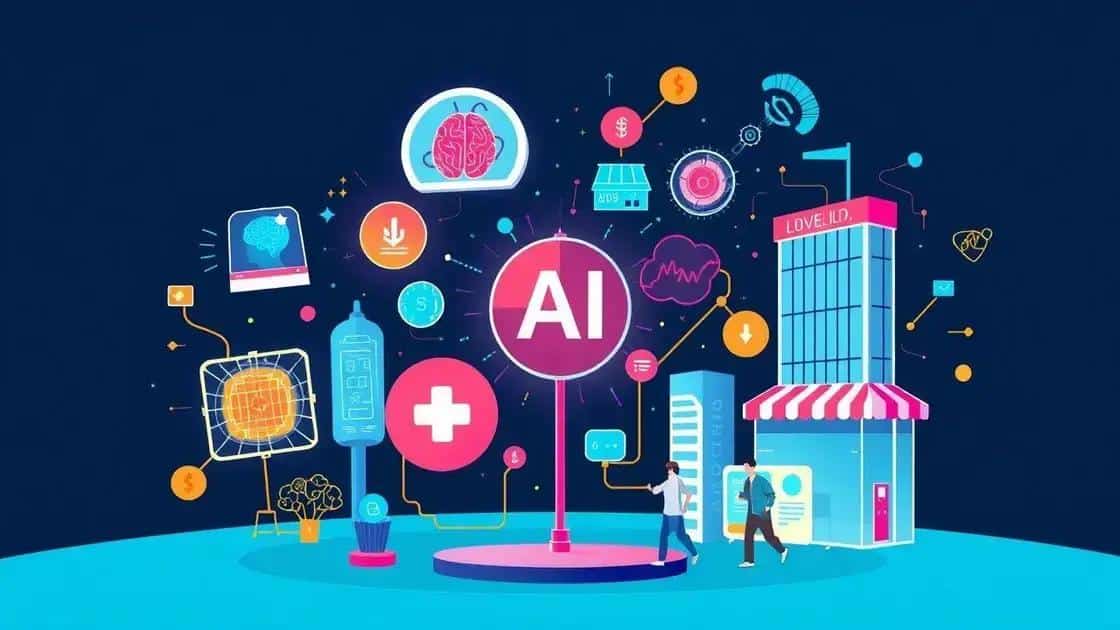AI innovation trends you can’t afford to ignore

AI innovations in business will lead to increased automation, personalized customer experiences, and enhanced decision-making, enabling companies to remain competitive and adapt to changing market conditions.
AI innovation trends are rapidly changing the landscape of various industries, pushing boundaries and redefining possibilities. Have you ever wondered how these shifts might impact your daily life or work? Let’s dive into the emerging trends that could shape the future.
Understanding AI innovation trends
Understanding AI innovation trends is crucial for staying competitive in today’s rapidly changing market. Innovations in artificial intelligence offer new tools and strategies that can enhance efficiency and drive growth. Organizations that grasp these trends may find unique opportunities to differentiate themselves.
What Are AI Innovation Trends?
AI innovation trends refer to the latest developments and applications of AI technologies. These can include advancements in machine learning, natural language processing, and robotics. By leveraging these technologies, businesses can streamline operations and improve decision-making processes.
Key Areas Affected by AI Innovations
AI is reshaping various sectors. Here are some key areas:
- Healthcare: AI helps in diagnostics and personalized medicine.
- Finance: Algorithms are used for fraud detection and risk management.
- Retail: Personalized shopping experiences are enhanced through AI.
- Manufacturing: Automation powered by AI improves production efficiency.
These innovations not only transform processes but also change customer experiences. For instance, companies that adopt AI can provide support through chatbots, reducing wait times and increasing satisfaction. As more businesses embrace AI, the trends will continue to evolve.
Adopting AI innovations can present challenges, such as data privacy concerns and the need for skilled personnel. Businesses must navigate these hurdles to fully benefit from the advancements. However, the potential rewards make it worthwhile to explore these trends actively.
Staying informed about current and emerging AI innovation trends will allow businesses to adapt and thrive. Engaging with these changes can lead to new opportunities and enhanced efficiency on many levels. Being proactive in understanding these developments is key to maintaining a competitive edge.
Key sectors transformed by AI

Key sectors are being transformed by AI innovations, creating new opportunities and efficiencies. Various industries are increasingly integrating artificial intelligence to streamline their operations and enhance service delivery. Understanding which sectors are leading this transformation is essential for leveraging AI technology.
Healthcare Transformation
The healthcare industry is witnessing significant changes due to AI. AI-driven tools help diagnose diseases earlier and more accurately. Machine learning algorithms analyze patient data to recommend customized treatments, making healthcare more effective.
- Telemedicine: AI enhances virtual consultations.
- Predictive Analytics: It predicts disease outbreaks.
- Robotic Surgery: Improves precision and reduces recovery time.
These advancements in healthcare are revolutionizing patient care and operational efficiency, furthering the quest for better health outcomes.
Finance Sector Innovations
In the finance sector, AI is redefining traditional practices. Algorithms assess risks and detect fraudulent activities more effectively than ever before. Financial institutions leverage AI to enhance customer service and automate routine tasks.
Robots and algorithms can analyze market trends, offering insights that guide trading strategies. As a result, clients receive tailored financial products that meet their specific requirements.
The rise of robo-advisors exemplifies AI’s impact in finance. These platforms provide investment advice using AI technology, making financial management accessible for everyone.
Retail and E-commerce Enhancement
Retailers are adopting AI for inventory management and personalized shopping experiences. By analyzing consumer behavior through data, businesses optimize stock levels and tailor promotions.
- Chatbots: Assist customers 24/7.
- Personalized Recommendations: Enhance user experience.
- Supply Chain Optimization: Improves delivery times.
These applications not only boost sales but also enhance customer satisfaction, which is crucial in today’s competitive market.
AI is also making waves in other sectors, such as manufacturing, education, and transportation. Each industry utilizes AI technology to maximize efficiencies and innovate practices. As companies begin to recognize the potential of AI, we will continue to see widespread adoption across various sectors.
Challenges in adopting AI innovations
Challenges in adopting AI innovations can hinder progress for many businesses. Despite the numerous benefits that artificial intelligence offers, organizations often face significant barriers that slow down or prevent successful implementation. Recognizing these challenges is key to overcoming them.
Data Privacy and Security Concerns
One major issue is data privacy. Companies must handle vast amounts of data to train AI systems. This raises concerns about how data is collected, stored, and used. Businesses must ensure robust security measures are in place to protect sensitive information.
- GDPR Compliance: Organizations must adhere to regulations like GDPR.
- Data Breaches: Cybersecurity threats can lead to compromised customer data.
- Transparency: Customers want to know how their data is used.
Failure to address these concerns can lead to loss of trust from customers, which can negatively impact business relationships.
High Costs of Implementation
The financial investment required to integrate AI innovations can be daunting. Organizations often need to invest in new technologies, hire skilled professionals, and provide training for existing staff.
These costs might discourage companies, especially small and medium-sized enterprises (SMEs), from adopting AI. However, businesses must weigh the potential long-term benefits against the upfront costs to make informed decisions.
Lack of Skilled Workforce
Another challenge is the shortage of qualified personnel. As demand for AI expertise grows, there are not enough skilled workers to fill the gaps. This can lead to project delays and hinder the effectiveness of AI initiatives.
- Training Programs: Organizations may need to develop internal training.
- Partnerships: Collaborating with educational institutions can help.
- Remote Work: Expanding the talent pool through remote hiring strategies.
Investing in upskilling existing employees can help address this issue and build a more capable workforce.
Overall, while challenges in adopting AI innovations exist, they are not insurmountable. With strategic planning and commitment, organizations can navigate these obstacles effectively and harness the transformative power of AI.
Future predictions for AI in business

Future predictions for AI in business show a direction filled with opportunities and advancements. As technologies evolve, AI is expected to play an even larger role in various sectors. Understanding these predictions can help companies prepare for what’s to come.
Increased Automation
One major trend is the ongoing rise of automation. Businesses will increasingly rely on AI technologies to handle routine tasks. This will free up employees to focus on more strategic activities. Automation will streamline operations and improve productivity across sectors.
- Customer Service: Chatbots will manage inquiries efficiently.
- Inventory Management: AI will predict stock needs in real-time.
- Data Analysis: AI will provide deeper insights faster than ever.
This shift will not only enhance operational efficiency but also enable companies to respond quickly to market changes.
Personalized Customer Experiences
Another prediction is the growth of personalized experiences. AI will analyze customer data to tailor interactions, creating unique shopping journeys. As AI tools improve, customers can expect recommendations and services that match their preferences closely.
Businesses will leverage this information to enhance customer satisfaction and loyalty. For example, e-commerce platforms might offer product suggestions based on browsing history and previous purchases, making shopping more intuitive and enjoyable.
Enhanced Decision-Making
Future advancements in AI will also aid decision-making processes. With better data analysis capabilities, companies will make informed choices quickly. AI tools will spot trends and predict outcomes, leading to smarter strategies.
- Predictive Analytics: Companies will foresee challenges and opportunities.
- Market Analysis: AI will identify emerging trends faster.
- Risk Management: Companies can evaluate potential risks accurately.
By utilizing AI, organizations will navigate their markets with more confidence, ultimately leading to improved performance.
Overall, the future of AI in business indicates a landscape rich with innovation. As technology continues to develop, companies that adapt will thrive and remain competitive. The integration of AI is set to redefine the way businesses operate, ensuring they are ready for tomorrow’s challenges.
In conclusion, the future of AI in business looks promising and full of potential. As companies embrace these innovations, they can expect increased automation, personalized customer experiences, and enhanced decision-making capabilities. Addressing the challenges of integration will be crucial for success. Those who adapt and leverage AI technology will find themselves at a competitive advantage in the evolving marketplace. As we look ahead, it’s clear that AI will continue to shape the way businesses operate and interact with customers.
FAQ – Frequently Asked Questions about AI in Business
How can automation benefit my business?
Automation helps by taking over repetitive tasks, allowing your team to focus on more strategic activities and improving overall productivity.
What tools can I use for data analysis?
There are various tools available, such as Google Analytics, Tableau, and Microsoft Power BI, which help collect and interpret valuable data.
What are chatbots, and how do they improve customer service?
Chatbots are virtual assistants that can respond to inquiries and solve problems at any hour, enhancing customer experience and freeing up your team.
How can I personalize customer experiences?
By analyzing data, you can better understand customer preferences and offer tailored recommendations and promotions.





